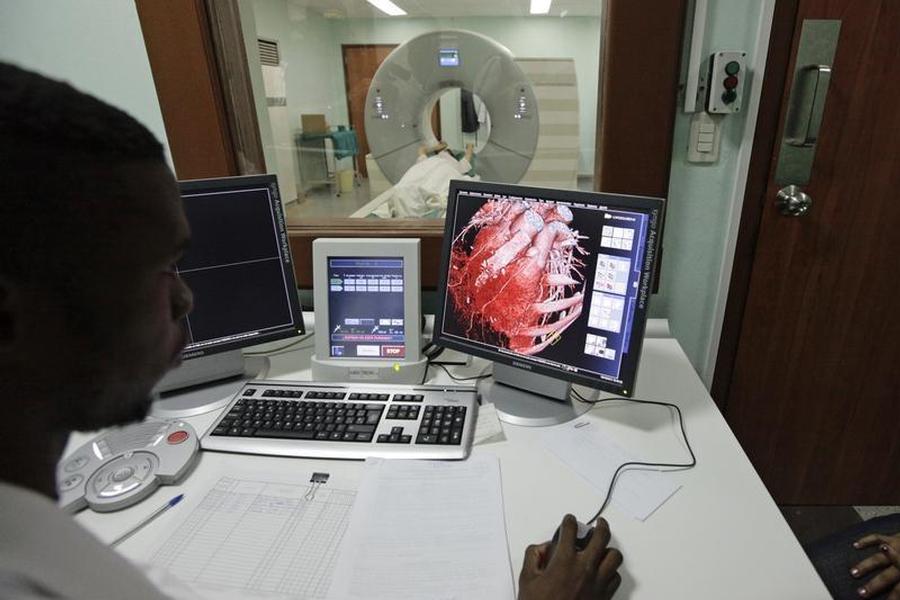New Measures Aim To Prevent Sudden Cardiac Death

A doctor observes a screen showing a graphical representation of a heart of a woman who is lying down during a whole-body scan in the tomography section of Havana's main cardiology and heart surgery hospital October 19, 2012. REUTERS/Desmond Boylan REUTERS/Desmond Boylan
NEW YORK (Reuters Health) - A new set of clinical performance and quality measures from the American Heart Association/American College of Cardiology (AHA/ACC) aims to prevent sudden cardiac death (SCD).
"I hope physicians are reminded that sudden cardiac death is the most common mode of death in this country and until this report was put together, we had no performance measures proposed to reduce the risk of sudden cardiac death," Dr. Sana M. Al-Khatib from Duke University Medical Center, Durham, North Carolina told Reuters Health by email. "Hopefully, this report will start many quality improvement efforts geared toward improving the care and outcomes of patients at risk for sudden cardiac death and victims of sudden cardiac arrest."
Dr. Al-Khatib and colleagues on the AHA/ACC Task Force on Performance Measures were charged with creating the first comprehensive measure set in this area. They based their recommendations on the available evidence base, existing initiatives related to SCD, and other considerations.
The clinical performance and quality measures for prevention of SCD fall into four categories: preventive cardiology; resuscitation/emergency cardiovascular care; heart failure/general cardiology; and electrophysiology. These measures apply across four dimensions of care: diagnosis, patient education, treatment, and self-management.
The proposed quality measures include:
- Screening for family history of SCD
- Screening for asymptomatic left ventricular dysfunction when a strong family history of cardiomyopathy and SCD is present
- Referral of family members for CPR and automated external defibrillator (AED) education
- Counseling of first-degree relatives of survivors of sudden cardiac arrest (SCA)
Only this last measure might be considered controversial. "We have a large multicenter randomized clinical trial, the HAT trial, that showed no improvement in patient outcomes with this approach," Dr. Al-Khatib said. Still the concept makes sense and it is worth exploring this again."
The performance measures include smoking cessation intervention in at-risk patients, use of implantable cardioverter defibrillator (ICD) in certain patients, use of guideline-directed medical therapy for prevention of SCD in certain patients, documentation of the absence of reversible causes of cardiac arrest before a secondary-prevention ICD is placed, and counseling eligible patients about an ICD.
"The writing committee believes this new performance measure set will greatly assist clinicians in providing better care to their patients at risk of SCA, and robust application of these measures will ultimately improve quality of patient care and outcomes," the authors conclude. "The writing committee also recognizes that much remains to be done to develop additional measures to prevent SCD and treat SCA, develop outcome measures, and further integrate shared decision making and shared accountability principles into future versions of this measure set."
Dr. Andrew Krahn from University of British Columbia, Vancouver, Canada, who recently reviewed SCD, told Reuters Health by email, "The vast majority of at-risk patients are not being evaluated for their risk and undergoing a formal discussion that includes life choices (provider awareness and willingness to have this discussion is a serious limitation)."
"We need a more formal life preferences/end-of-life process embedded in primary care that will lead to optimal medical care and people declaring their preferences regarding an ICD," he said. "Our system does not support/reimburse family and end-of-life counseling, and a shift to develop decision support and counseling processes will help determine who is at risk and how best to protect them."
Story Credit: https://www.zawya.com/mena/en/story/New_measures_aim_to_prevent_sudden_cardiac_death-ZAWYA20161222062518/


